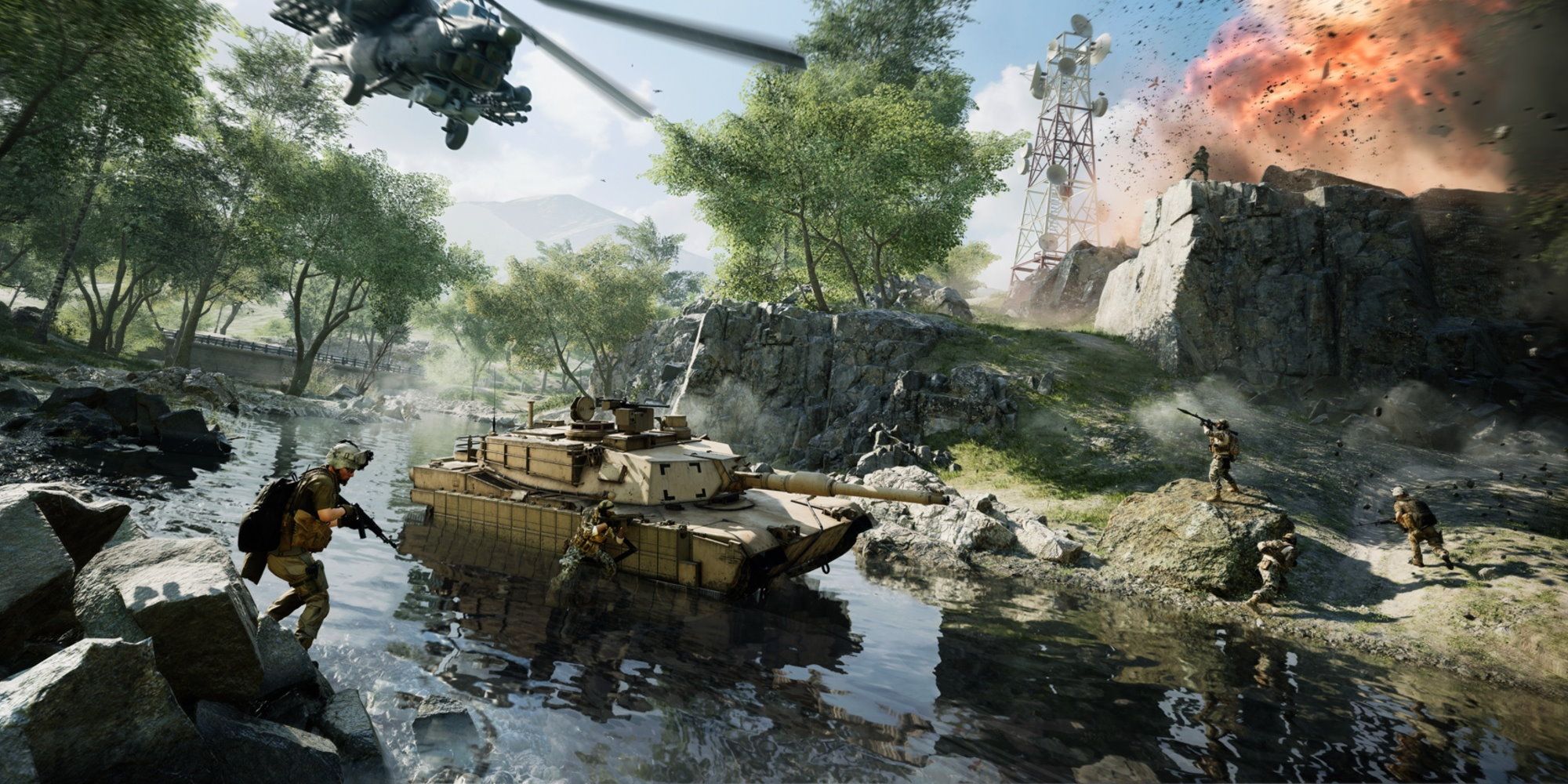The soundtrack for Battlefield 2042 is being composed by Hildur Guðnadóttir, the award-winning composer behind Chernobyl and Joker—for which she won the Oscar for Best Original Score in 2020. The producer of both soundtracks was Sam Slater, a longtime collaborator with Guðnadóttir, who is co-composing the Battlefield 2042 score with her. I sat down with Slater to talk about their work on the game, making music with buckets of metal, and what we can expect from the audio landscape of this vision of a future ravaged by war and climate change.
"This is the first time I've been a co-composer with Hildur," says Slater. "We're both composers, but my skill set largely leans on production, while hers is a traditional kind of filmic writing. In other scores we've worked on it's been very clearly Hildur's voice, with me supporting that as a producer. In this game it's our voices coming together."
Chernobyl and Joker both have stylish, downbeat, understated music, which makes Guðnadóttir and Slater perhaps an odd choice to score a game about hundreds of soldiers sprinting around shooting each other while skyscrapers collapse. "We knew there were gonna be different expectations in regards to the energy level and the way the music functioned," says Slater. "But the world of Battlefield 2042 actually has a lot in common with something like Chernobyl. There's a real tension at play, and a kind of looming darkness in the world. It's not a historical game which needs something romantic and nostalgic. It's not futuristic sci-fi that needs clean, punchy synths. It's a vision of the near future where everything has gone to shit. In amongst all the chaos that's going on, there's a lot of weight and tension, and that sounded like a good fit for our voices."
The music in Battlefield 2042 will still be exciting and dramatic, but in a less obvious way than other games in the series—which usually opt for fairly typical Hollywood-style music. "It still has to hit that Battlefield energy," says Slater. "We just get there a little differently. The thing that attracted us was the world. We're not necessarily the right sort of people to do pure action music, but DICE were looking for something different. It still wanted the music to capture the excitement of how the game plays, but also reflect the larger context in which it's happening. It's a wild world, but a familiar one too, and we loved that about it."
I ask Slater what it's like working on music for an intensely interactive medium, rather than just something that is viewed passively on a screen. "An audio engine is an incredibly beautiful, complex thing and there's so much to explore compositionally. Hildur and I ultimately still rested on some very simple things. The score isn't a generative landscape that reinvents itself constantly. We focused more on the way that music can work in tandem with the sound design in a coherent way. At some points you might not even necessarily notice that the music is there, but it adds to the texture and the density of the world around you."
To create the music for the game, Slater and Guðnadóttir developed some pretty offbeat techniques. "All of the music is built from the materials of your surroundings. So if you're in a level made of sand and glass, we're making everything out of sand and glass—and I mean everything. We created crazy systems like buckets of gravel with huge bass drivers placed beneath them. It was really exploratory. As a musician you learn to create a sense of immersion in music. Often it's about space, width, and depth. But the moment that you put that into a game, with material sounds that could be part of the level itself, suddenly you have a problem.
"If you have very wide, percussive, metallic music placed left and right of the player's ears, and they don't fully understand that it's music they're hearing, they react to it. A player might turn to their right because they think someone's there, when it's actually just the soundtrack. So we had to really consider that. After creating the musical world, we had to go into the game and make quite a few adjustments to make sure the player would be immersed, but not distracted or drawn out of the world by sounds that really do feel like a part of the environment you're in."
I wonder if this experimental, exploratory approach is typical for the pair when it comes to composing soundtracks. "When Hildur and I made the Chernobyl soundtrack, we went to a nuclear power station in Lithuania and recorded it with an amazing field recordist called Chris Watson," says Slater. "We recorded the station, then we made the entire soundtrack from just Hildur's voice and the processed sounds of the reactor itself. So we do have a history of these kinds of ideas. But they're also ideas that, within the world of experimental music, have been around since at least the 1920s. This idea of real environmental sound as music.
"What we learned in Chernobyl translated to Battlefield. There are eight individual landscapes, which let us go even further. It wasn't just one space. There's a level called Kaleidoscope that's based on a South Korean city 20 years into the future. It's very much about the interaction between man and glass. It's one of the least natural levels, with these huge, towering skyscrapers made of glass. We worked with a coder in Berlin to create a machine learning algorithm that we fed with a lot of recordings of glass. The algorithm processed the sonic qualities of the material, then we put in Hildur's voice and it reappropriated it as glass.
"There's also a level called Manifest, which is very ordered and made up of shipping containers, so we wanted a cyclic pattern that reflected that. We had buckets filled with differently sized pieces of metal, and oscillating patterns that would hit them and create different kinds of vibrations. We never had a clue what was going to come out of these different processes, but we were always pleasantly surprised by the results."
Guðnadóttir is an interesting choice for a noisy, brash blockbuster like Battlefield, but her presence will undoubtedly give the game a highly distinctive sonic personality. Slater also appreciates that EA and DICE let the pair be so experimental, and spend a lot of time figuring out unusual ways to make unique sounds. "DICE didn't want the music in this game to feel familiar," he says. "It wanted to push people a bit, and it held onto that all the way through. I have a lot of respect for them for doing that, and giving us space to prove that our ideas would work."



